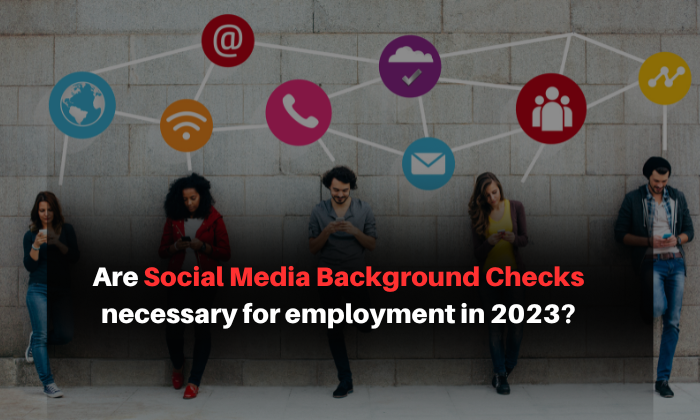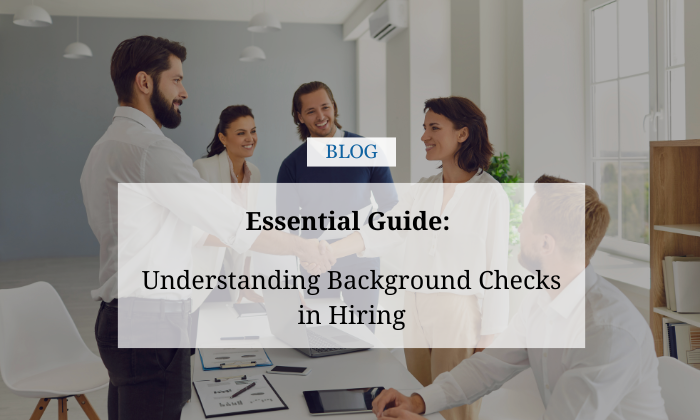In today’s digital age, social media has become a ubiquitous part of our lives. We use it to connect with friends and family, share our thoughts and opinions, and even find new job opportunities. However, as more employers turn to social media background checks as a way to learn more about potential employees, questions arise about the ethics and legality of this practice.
On one hand, proponents argue that social media can provide valuable insight into an applicant’s character, work ethic, and overall personality. For example, an employer may view a candidate’s LinkedIn profile to see their professional experience and qualifications or scan their Twitter account for any controversial statements or behavior that could reflect poorly on the company. Additionally, some employers may use social media to ensure that candidates align with company values or are not engaging in illegal activity outside of work hours.
The Argument For Social Media Background Checks
As we enter the digital era, a growing number of employers are resorting to social media background checks to gain deeper insights into prospective employees. Despite some apprehension surrounding the reliability and confidentiality of such checks, employers can also reap several advantages, rendering social media background checks an advantageous tool.
Social media background checks offer several advantages to employers, one of which is the ability to flag potential issues. For instance, if a candidate’s social media activity reveals illegal behavior, drug use, or extremist ideologies, this could indicate they are not a suitable fit for the organization. Additionally, social media background checks can help identify candidates who falsified information on their resumes. For example, a candidate claiming to have held a job that they never actually had.
Another benefit of social media background checks is the opportunity to gauge a candidate’s personality and alignment with the company culture. If a candidate frequently shares negative or divisive content on social media, it may be a red flag for companies with a positive work environment. Moreover, social media checks can provide insights into how a candidate interacts with others online, which is useful for positions that require strong teamwork and customer service skills.
Despite these advantages, there are valid concerns about the privacy and accuracy of social media background checks. Employers must obtain the candidate’s consent before conducting these checks, and should take care to avoid any biased or misinterpreted information. Ultimately, social media background checks can be a valuable tool for employers, as long as they are used responsibly and with ethical considerations.
The Argument Against Social Media Background Checks
While social media background checks have their benefits, there are several concerns that employers should take into account before conducting them on job applicants. Firstly, social media background checks can be discriminatory, as they can potentially uncover a candidate’s protected characteristics, such as race, religion, or sexual orientation. This information could then be used to discriminate against the candidate during the hiring process.
Another issue is the potential for inaccuracy. Social media posts can be taken out of context or even fabricated. Employers should be cautious not to make hiring decisions based on inaccurate information, which could lead to legal repercussions.
Moreover, social media background checks can infringe upon a candidate’s right to privacy. Social media platforms are considered personal spaces, and candidates may not wish to share certain information with their potential employers. Employers should always obtain the candidate’s consent before conducting any form of social media background check.
It is also important to consider whether social media background checks are necessary in the first place. Traditional background checks, which can uncover information on a candidate’s employment history, criminal history, and financial history, may be more relevant to their job qualifications than their social media activity.
Aside from the above arguments, conducting social media background checks can also be time-consuming and expensive. They may be challenging to administer and manage, and they can lead to legal problems if not conducted in a fair and impartial manner.
Given these factors, employers should weigh the pros and cons of social media background checks before deciding to use them. It is advisable to consult with an attorney to ensure that they comply with all applicable laws and regulations.
The Boundaries Of Social Media Background Checks
As the use of social media becomes increasingly prevalent in our daily lives, it is not surprising that employers are turning to social media background checks as a way to evaluate potential employees. However, there are important legal and ethical boundaries that must be considered when conducting such checks.
Privacy is one of the most critical boundaries that employers must be mindful of when conducting social media background checks. Employees have a right to privacy in their personal lives, including their social media activity. Thus, employers must obtain a candidate’s consent before conducting a social media background check, and they must be cautious not to invade their privacy by accessing social media accounts without proper authorization.
Another important boundary is the prohibition on discrimination. Employers cannot use social media background checks to discriminate against candidates based on protected characteristics such as race, religion, gender, or sexual orientation. Stereotyping or making hiring decisions based on assumptions drawn from social media posts can result in unlawful discrimination.
Employers must also be aware of the limitations of social media background checks. Social media posts can be taken out of context, and it is crucial to understand that a candidate’s social media activity may not be a reliable indication of their qualifications or character. In addition, conducting social media background checks can be time-consuming, expensive, and not always necessary for all job positions.
Overall, understanding the legal and ethical boundaries of social media background checks is essential for employers to ensure that they use this tool in a way that is fair, lawful, and ethical. By being aware of these boundaries, employers can use social media background checks as a helpful tool to assess a candidate’s suitability for a job, without compromising the candidate’s rights or violating any laws.
The Future Of Social Media And Employment
In today’s digital age, social media has become an essential tool for professionals to showcase their skills, connect with industry leaders, and stay up-to-date on the latest trends in their field. In fact, according to a study by CareerBuilder, 70% of employers now use social media to screen job candidates. As a job seeker, it’s important to understand how you can use social media to your advantage and improve your job prospects.
One effective way to use social media for your career is to network with people in your industry. Follow influencers and thought leaders in your field, attend industry events, and participate in online discussions. By building relationships with other professionals in your industry, you can learn about job openings, get advice, and gain valuable insights into your field.
Another way to use social media to your advantage is to showcase your skills and experience. Share articles and blog posts that you find interesting, and write about your own experiences in your field. This can help you to establish yourself as an expert in your industry and demonstrate your value to potential employers.
It’s also important to use social media to stay up-to-date on industry trends. Follow news organizations and industry publications, and read blogs and articles about the latest trends in your field. This will help you to stay informed about changes in your industry and ensure that you are always learning new things.
However, it’s important to remember that anything you post on social media can be seen by potential employers. So, it’s crucial to be professional and mindful of what you post online. Avoid posting anything that could be considered offensive or controversial and always proofread your posts before publishing.
When using social media, be aware of your privacy settings and adjust them accordingly to control who can see your posts. It’s also crucial to be careful about what you post online, as anything you share can be seen by potential employers.
In summary, social media is a powerful tool that can help you to improve your job prospects and advance your career. By using it effectively, you can network with industry leaders, showcase your skills and experience, stay up-to-date on industry trends, and increase your chances of landing your dream job.
Conclusion
In conclusion, there is no easy answer to the question of whether or not social media background checks are necessary for employment in 2023. There are both pros and cons to consider, and the decision of whether or not to conduct social media background checks ultimately rests with the employer.
There are both advantages and disadvantages to conducting social media background checks. On the one hand, these checks can provide employers with a more complete picture of a candidate’s personality, interests, and behavior outside of the workplace. This information can help employers determine whether a candidate is a good fit for the company culture and can also assist with making a hiring decision.
On the other hand, there are legal and ethical boundaries that employers must be aware of when conducting social media background checks. Employers cannot use social media to discriminate against candidates on the basis of protected characteristics such as race, religion, gender, or sexual orientation. Additionally, employers must obtain a candidate’s consent before conducting a social media background check.
Therefore, employers should carefully weigh the pros and cons of social media background checks and make a decision that is fair, legal, and ethical. Job seekers should also be aware of the potential impact of social media on their job prospects. They should use social media responsibly and professionally, and they should be mindful of what they post online.
Ultimately, the decision of whether or not to conduct social media background checks rests with the employer. However, it is important for both employers and job seekers to be aware of the potential benefits and drawbacks of these checks and to act in a responsible and ethical manner when using social media in the employment process.
How Securecheck360 can help?
Securecheck360 offers Social Media Searches to help employers protect their reputation by identifying any past or present public history of job candidates that could potentially damage the company’s image. We understand the importance of maintaining the privacy of applicants and their right to free speech, as guaranteed by the Constitution’s first amendment. Our policies adhere to the guidelines set forth by the ADA and EEOC for reporting, and we take care to sort through large amounts of posts and comments while redacting any information that could lead to discrimination or privacy liability. In doing so, we ensure that all information is handled responsibly and with the utmost consideration for the rights of all parties involved.
To know more about our services, book your free demo today!







